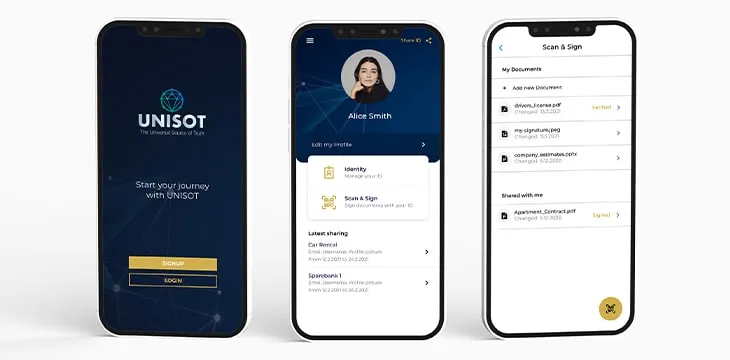|
Getting your Trinity Audio player ready...
|
UNISOT ID has been approved for listing at the Digital Identity Foundation, providing important academic validation for the protocol.
We are proud to have UNISOT ID (did:unisot) listed at the Decentralized Identity Foundation (DIF). UNISOT DID is compliant with @w3c specifications, that means that anyone can resolve a UNISOT DID Document in a trusted and easy way.#IDentificationhttps://t.co/yHo59vUADZ
— UNISOT (@UNISOT_) May 25, 2021
News of the listing approval means anyone building applications or processing data can resolve a UNISOT DID document in a trusted way with ease. The DID schema complies with W3C specifications for decentralized identifiers, making it straightforward for implementation.
In an announcement posted to the UNISOT website, UNISOT Enterprise Architect Mirko Stanić said the company was proud to have been accepted for listing at the foundation.
“We are proud to have UNISOT ID (did:unisot) listed at the Decentralized Identity Foundation (DIF). As part of our commitment to open technologies and global interoperability we have presented our DID schema (did:unisot) to the Decentralized Identity Foundation (DIF) and supplied a driver for their Universal DID Resolver which can be accessed at: https://resolver.identity.foundation/. With this anyone can resolve a UNISOT DID Document in a trusted and easy way.”
UNISOT is a supply chain management platform powered by BSV enterprise blockchain. It provides supply chain management as a service, delivering access to an open global business network for more efficient supply chains.
The company describes its UNISOT ID service as an “Enterprise Self-Sovereign Identity system,” which can be used to more effectively manage and control digital identities.
“UNISOT ID is an Enterprise Self-Sovereign Identity (SSI) system enabling individuals and organizations to have sole ownership of their Digital Identities, as well as full control over how their personal data is shared and used. Offering an alternative to current data silos by democratizing control over data. With SSI, every individual or organization can decide where data is stored – full data portability – or with whom data is being shared and for what purpose.”
The technology provides an alternative to data silos, while enabling new business models and increasing the security and integrity of data, versus paper-based credentials and verification processes.
According to UNISOT, the SSI system also delivers greater transparency for the collection and use of personal data.
“SSI can bring greater transparency to the way personal data is currently requested, accessed, and used within the public sector. This change to transparency is because persons are in full control of their data and therefore no one can access or use their data without their consent which is why they must be involved in every transaction. Even if some decide to opt into policies for automating data transmissions they can always opt out.”
“Through UNISOT ID our users have the ability of minimal and selective data disclosure which means that you can have very detailed information about what data is required and used by the other parties you interact with.”
UNISOT ID also helps facilitate greater compliance with regulations, including Europe’s GDPR rules and the European Self-Sovereign Identity Framework, while empowering individuals and organizations to take greater control of their data.
There are also efficiency gains that come with utilizing the SSI, reducing the cost burden on companies for collecting and verifying data with more streamlined processes.
DIF is concerned with an engineering-led approach to providing open access to decentralized identity and ensuring interoperability between different participants. The body represents a broad cross-section of members working together to achieve these common strategic goals, including Consensys, Blockstack, Microsoft, Hyperledger and Accenture amongst others.
UNISOT was developed on the BSV enterprise blockchain, as the only blockchain with capacity for unbounded scale and handling data at enterprise volumes. The listing with DIF means UNISOT ID will be more open to the network of organizations already searching for similar solutions for decentralized digital identities.
See also: CoinGeek Live panel, Token Solutions on BSV blockchain

 08-14-2025
08-14-2025 




